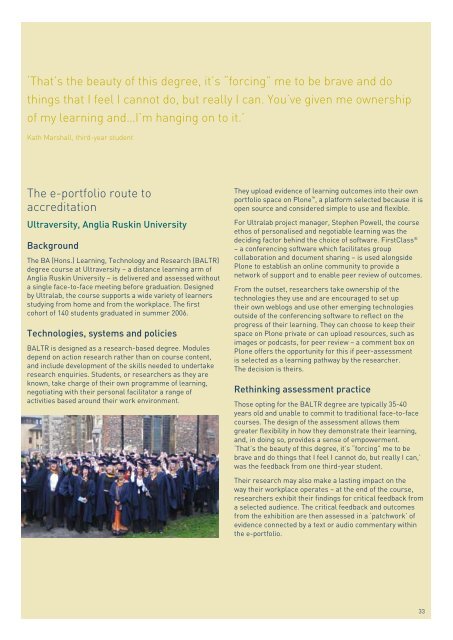Effective Practice with e-Assessment: An overview of ... - Jisc
Effective Practice with e-Assessment: An overview of ... - Jisc
Effective Practice with e-Assessment: An overview of ... - Jisc
Create successful ePaper yourself
Turn your PDF publications into a flip-book with our unique Google optimized e-Paper software.
‘That’s the beauty <strong>of</strong> this degree, it’s “forcing” me to be brave and do<br />
things that I feel I cannot do, but really I can. You’ve given me ownership<br />
<strong>of</strong> my learning and…I’m hanging on to it.’<br />
Kath Marshall, third-year student<br />
The e-portfolio route to<br />
accreditation<br />
Ultraversity, <strong>An</strong>glia Ruskin University<br />
Background<br />
The BA (Hons.) Learning, Technology and Research (BALTR)<br />
degree course at Ultraversity – a distance learning arm <strong>of</strong><br />
<strong>An</strong>glia Ruskin University – is delivered and assessed <strong>with</strong>out<br />
a single face-to-face meeting before graduation. Designed<br />
by Ultralab, the course supports a wide variety <strong>of</strong> learners<br />
studying from home and from the workplace. The first<br />
cohort <strong>of</strong> 140 students graduated in summer 2006.<br />
Technologies, systems and policies<br />
BALTR is designed as a research-based degree. Modules<br />
depend on action research rather than on course content,<br />
and include development <strong>of</strong> the skills needed to undertake<br />
research enquiries. Students, or researchers as they are<br />
known, take charge <strong>of</strong> their own programme <strong>of</strong> learning,<br />
negotiating <strong>with</strong> their personal facilitator a range <strong>of</strong><br />
activities based around their work environment.<br />
They upload evidence <strong>of</strong> learning outcomes into their own<br />
portfolio space on Plone , a platform selected because it is<br />
open source and considered simple to use and flexible.<br />
For Ultralab project manager, Stephen Powell, the course<br />
ethos <strong>of</strong> personalised and negotiable learning was the<br />
deciding factor behind the choice <strong>of</strong> s<strong>of</strong>tware. FirstClass ®<br />
– a conferencing s<strong>of</strong>tware which facilitates group<br />
collaboration and document sharing – is used alongside<br />
Plone to establish an online community to provide a<br />
network <strong>of</strong> support and to enable peer review <strong>of</strong> outcomes.<br />
From the outset, researchers take ownership <strong>of</strong> the<br />
technologies they use and are encouraged to set up<br />
their own weblogs and use other emerging technologies<br />
outside <strong>of</strong> the conferencing s<strong>of</strong>tware to reflect on the<br />
progress <strong>of</strong> their learning. They can choose to keep their<br />
space on Plone private or can upload resources, such as<br />
images or podcasts, for peer review – a comment box on<br />
Plone <strong>of</strong>fers the opportunity for this if peer-assessment<br />
is selected as a learning pathway by the researcher.<br />
The decision is theirs.<br />
Rethinking assessment practice<br />
Those opting for the BALTR degree are typically 35-40<br />
years old and unable to commit to traditional face-to-face<br />
courses. The design <strong>of</strong> the assessment allows them<br />
greater flexibility in how they demonstrate their learning,<br />
and, in doing so, provides a sense <strong>of</strong> empowerment.<br />
‘That’s the beauty <strong>of</strong> this degree, it’s “forcing” me to be<br />
brave and do things that I feel I cannot do, but really I can,’<br />
was the feedback from one third-year student.<br />
Their research may also make a lasting impact on the<br />
way their workplace operates – at the end <strong>of</strong> the course,<br />
researchers exhibit their findings for critical feedback from<br />
a selected audience. The critical feedback and outcomes<br />
from the exhibition are then assessed in a ‘patchwork’ <strong>of</strong><br />
evidence connected by a text or audio commentary <strong>with</strong>in<br />
the e-portfolio.<br />
33
















